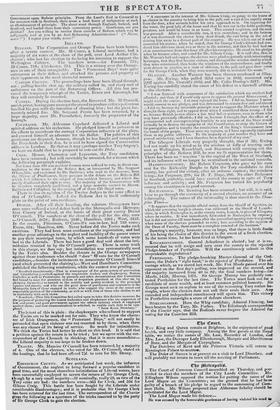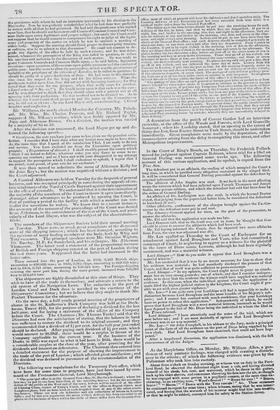Cbe ffirtrapotti.
The Court of Common Council assembled on Thursday, and pro- ceeded to elect the members of the City Lands Committee. Mr. Effingham Wilson opposed the motion for putting the name of the Lord Mayor on the Committee; on the ground that he had been guilty of a breach of his pledge in regard to the summoning of Coes- mon Halls. Mr. Wilson proposed that Alderman Scholey should be substituted for the Lord Mayor.
The Lord Mayor made his defence— He was accused by the honourable gentleman of having violated his word ita the gentlemen with whom he had an interview previously to his election to the Mayoralty. Now he was perfectly satisfied that what he had done was perfectly iu linib011 with all that he had promised. He had told the gentlemen who waited upon him, that he should not hesitate to call Courts of Common Council and Com- mon Halls upon every legitimate and proper subject ; but surely the Court could not Suppose that he would consent to compromise his tight to judge of the legiti- macy and proptiety of the matter on which he was to sanction a meeting of either lardy. Suppose the meeting should thiuk proper to discuss petty treason, K sedition, was he to submit to that discussion ? lie could not consent to de- grade the dignity of the office he held by such a course; and be was deter- mined, whenever the prerogative of the King was called in question, to refuse Ms sanction and authority to the discussion of such muter. Ile was ready to grant Common Councils and Common Halls upon, es he said before, legitimate ...tvagiom— upon occasions ofiliseussions upon public measured and the conduct of public men t but if he were to allow the prerogative, which was Me great means of upholding the privileges of the citizens of London, to be called in questiou, he should b. guilty of a gross derelietiun of duty. Ile had come to this detertni- Sion 40.1 his respect fir the King and for his fellow citizens. When the gentlemen waited upon him, they did not act with becoming candour ; for they stated that they came for one purpose, when they really came fur another. (Load cries of "No, no!") lle ‘vutdd insist upon it that such was the case : and he was disgusted to think that they should come with a pretext not at all agreeing trill' their professions. Ile was resolved not to be dictated to. As to whether the Court would think proper to put his name on the Committee or act, Le did not at all care—he was Lord Mayor still, notwithstandiug. ( Great laughter and confusion.)
Mr. Williams, the newly-elected Member for Coventry, Mr. Pritch- ard, Mr. Wire, Mr. Charles Pearson, and Mr. Richard Taylor, supported Mr. Wilson's motion ; which was feebly opposed by Mr. Jupp and Alderman Brown. On a division, the motion was carried by u majority of 85 to .59.
After the decision was announced, the Lord Mayor got up and de- livered the following speech-
*, Gentlemen, the vote von have just come to has given me the proudest satis- lhetion. I consider that li have dorm what any honest man ought to have done.
At the same tine that I speak of the satisfaction I feel, I am ready to do suit and service. You have excluded me from the Committee upon political grounds. (Expressions of dissent.) I shall steadily pursue the course which
I think I am bound to follow, whatever votes you may fancy to come to re- specting may conduct ; and as I have met with your disapproval in my attempt to support the prerogative which I shall endeavour to uphold, I repeat that I am proud, most proud, of your vote for my exclusion."
It was then moved to substitute the name of Alderman Kelly for Sir John Key's ; but the motion was negatived without a division ; and the Court adjourned.
A Court of Aldermen was held on Tuesday for the despatch of general business, and was occupied principally in considering the appeals of cer- tain inhabitants of the Ward of Castle Baynard against their appointment to the (dike of constable. We understand that it is the determination of the majority of the members of the Court to throw it open immediately. Amongst other advantages to be produced by opening the Court, is that of putting a period to the facility with which a member can con- tradict the assertions he makes. We know that in a recent instance, the accuracy of the account of the proceedings of the Court was denied by an Alderman, to the astonishment of the rest of the Court, and parti- cularly of the Lord Mayor, who was the subject of the observations.— Globe, The members of the Shipowners Society held their annual meeting on Tuesday. There were, as usual, great complaints of the distressed state of the shipping interest ; which has been damaged, according to the opinions of many leading members of the body. both by Whig and Tory measures. The principal speakers were Mr. Octavius Wigram, 31r. Bartley, M. P. for Sunderland, and his colleague, Mr. Alderman Thompson. The latter read a statement of the proportional increase of British and Foreign shipping entered at the port of London during the last three years. It appeared that the latter bad increased in the larger ratio.
Theme entered into the port of London, in 1812, 3,167 British ships, amounting to 6211,026 tons ; in 18:38, 8,:tti5 ships, amounting to 669.8:35 tons; and in 1804, 8,721 ships, amounting to 7:10.554 tons, The Foreign shipping catering the same port has, diniug the saute period, increased from l51),394 tuns to 212,514 tons.
The shipowners are highly dissatisfied at this state of things. They wish to have all the trade to themselves, and advocate a return to the old system of the Navigation Laws. The reduction in the port of London Canal and Dock dues is ascribed to the exertions of the Shipowners' Committee ; but we believe that they ought to thank Mr. Poulett Thomson for the advantage.
On the same day, a half-yearly general meeting of the proprietors of shares in the St. Katherine's Dock Company was held ut the Dock- house, Tower Hill, for the purpose of declaring a dividend for the last half-year, and for laying a statement of the affairs of the Company before the Court. The Chairman ( Mr. Thomas Tooke) said that the Directors had now the satisfaction of stating, that the balance in band was sufficient to restore the dividend to its original amount ; and they recommended that a dividend of 13 per cent. for the half-year just ended should be declared. A fter paying such dividend of 13 per cent. which would amount to 20,291., there would be a surplus in favour of the Company applicable to the current year. It' the business of the Docks in 1835 was equal to what it had been in 1834, there would be a considerable surplus at the close of the year, after providing for the dividends and interest on debentures. The Chairman then entered into a detailed statement for the purpose of showing the improvement in the trade of the port of London ; which afforded great satisfaction ; and the dividend was declared in pursuance of the recommendation of the Directors.
The following new regulations for the Twopenny Post.office, which have been for some time in progress, have just been issued by com- mand of the Postmaster-General, Lord Maryborough.
'• The principal office is at the General Post.ollice, St. Martin's-le-Grand; where let- ters may he put in one hour later than at the receiviuglouses; but fur the aecummo- datiou of the public at the West end of the town. letters will be received at the office at Charing Cross, corner of Craig's Court, and at the office in Regent Street. near Laughamplace, halt' an hour later at each despatch than at any of the other receiv- ing-houses. There are now six deliveries and six collections of letters in Loudon daily ; and by this new regulation the WWII a'-clock delivery has been extended to all places in the environs of town within the circle of three miles trout the General Pest- office, most of which at present will have fly:deliveries and five d..spatelies daily. The Country del:very of the Twopenny-post has been extended from nine miles to a circle or twelv • miles from the Geuend Post-office.
" The follow.ng is the time letters should be put into the receiving house for each delivery of the day. In town, and that by which they are despatched. If put in at eight, ten. and twelve in the morning. two, live, and eight iu the afternoon. 'they are sent for delivery at ten and twelve iu the morning, two, four. and seven iu the after- noon, and eight WI lock next morning. Letters eau be put in one hour later than the above at the Georial post office ; and each delivery should be completed generally in about one hour, or one hour and a half after they are despatched. From London to the Country. if tut In by eight o'clock in the morning, two or five iu the afternoon, they are desist:cited nt ten o'clock in the morning, four and seven in the afternoon. To places having but two deliveries is day, letters are sent off at the abOVC hours of ten in the morning and four or seven in the atteruoon. Those that go off at ten o'clock, are delivered at no in ; those at four, me delivered the same evening ; and those at sewn o'clock. are dedvered early next morning. To places having only one post a day, they go off at ten o'clock, and are delivered the same day at noun. Letters from the Country to Loadon, it' put into the post in time fur the morning despatch, arrive in loon between ten and Oct en o'clock. and are sent out for delivery at twelve o'clock; if the afternoon despatch, at seven 'clock. The postage of each letterer package pass- ing from one put or me three miles circle to another is only twopence. To all places beyond this circle (being within the limits of this office) it is threepence. "'the postage of this office on each general or foreign post letter or packet to or from places beyond the three-miles circle, is twopence in addition to the general or foreign post.rate. Newspapers], if put into any Twopenny nntollice within the circle of three miles float the Gezteral Post.office, will pass to the Country districts of this office, if its covers open at the ends, fur mm penny each ; but from one part of the circle to another, or Item the Country to an) part of the circle, or one part of the Country to another, the postage is the same as for letters. No letters or rickets exceeding the weight of four ounces can be sent by this post, except such as have first passed by. or are intended to pass by. the General or Foreign mails. To prevent delay, the public should ',every particular with letters intended to pass through the Twopenny Post, that they are pot into the proper receivisig.houses ; us it too frequently happens that letters are put into a General Post receiviug house by mistake, whereby they are unavoidably' delayed in their delivery."
A deputation from the parish of Covent Garden had an interview yesterday, at the office of the Woods and Forests, with Lord Granville Somerset ; when his Lordship stated, that an opening to the extent of thirty-five feet, from Exeter Street to York Street, should be undertaken immediately. Great complaints were made by the deputation, of the inconvenience arising from the delay in completing this street, and other
Metropolitan improvements.



























 Previous page
Previous page